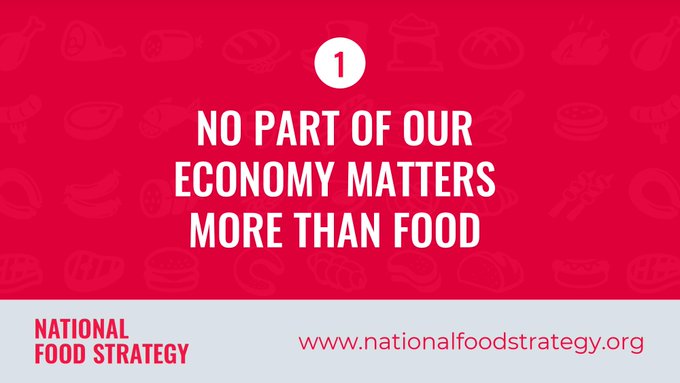
The Food, Farming and Countryside Commission published its final report on 16 July, saying that the UK must completely transition to a sustainable post-Brexit food system by 2030 or face further breakdown in climate and natural systems, and the continued rise in diet-related ill-health. The report’s launch featured talks by Secretary of State for Defra Michael Gove; and Henry Dimbleby, appointed by Defra to lead on development of a National Food Strategy.
Among several substantial recommendations, the Food, Farming and Countryside Commission report calls for "Collaborative community food plans to help inform and implement national food strategies and meet the different needs of communities around the UK". Meanwhile, Henry Dimbleby signalled that the National Food Strategy process will roll out over the coming weeks, seeking to stimulate a national conversation about food policy, calling for evidence and running citizens' assemblies to engage people from all backgrounds in the solutions.
Kath Dalmeny, chief executive of the Sustain alliance and one of the 15 Commissioners for the RSA Food, Farming and Countryside Commission, said:
“The Sustainable Food Cities network of over 50 UK towns and cities has outstanding experience and expertise in shaping food systems locally and bringing communities together around better food. Towns and cities are the major market for food, and urban dwellers have skills in organising, distribution, retail, marketing, procurement and making money work for good. We need to direct that energy and enthusiasm towards local, sustainable and agro-ecological farmers who can protect the climate, bees, water and natural systems we all depend on. We look forward to playing a part in accelerating the transition towards the Commission’s vision of a better food and farming future.”
Tom Andrews, network director of the Sustainable Food Cities network, said:
“News of a call for collaborative community food plans and a national conversation about food policy is music to our ears! The 57 towns and cities in the Sustainable Food Cities network are vibrant examples of local authorities, charities, businesses and community groups working together to improve health, the environment, the local food economy and prospects for sustainable food producers. Many of the cities in our network have also declared a climate emergency. Local food partnerships can play a vital role in bringing about the necessary changes in policy, practice and food culture. We look forward to providing evidence, supporting citizens’ assemblies, and offering expert witnesses to the National Food Strategy process, with experience grounded in local practice to improve the food system.”
Sustainable Food Cities network
The Sustainable Food Cities approach (now with 57 towns and cities in the UK as network members) involves developing a cross-sector partnership of local public agencies, businesses, academics and NGOs committed to working together to make healthy and sustainable food a defining characteristic of where they live. The Sustainable Food Cities Network helps people and places share challenges, explore practical solutions and develop best practice on key food issues.
RSA Food, Farming and Countryside Commission
Read the RSA Food, Farming and Countryside Commission’s final report, executive summary and Field Guide to the Future here.
Amongst several significant recommendations, the Commission calls for:
National Food Strategy
Find out more about the National Food Strategy here. At the RSA Food, Farming and Countryside Commission’s launch, Henry Dimbleby outlined the process for development of the National Food Strategy, saying:
In the next few weeks they will be:
Towards the end of the year they will be:

The National Food Strategy will also be informed by citizens’ assemblies – randomly selected demographically representative groups to grapple with the issues; to talk them through in the light of evidence presented by experts, to explore the various future scenarios, and debate the actions required to get us where we want to be.
National Food Strategy recommendations will be published this time next year. The government has agreed to respond with a White Paper after six months and has asked Henry Dimbleby to come back and review their actions another 12 months after that. To get involved – to give evidence, receive updates, or to help inform the national conversation, get in touch via: https://www.nationalfoodstrategy.org/